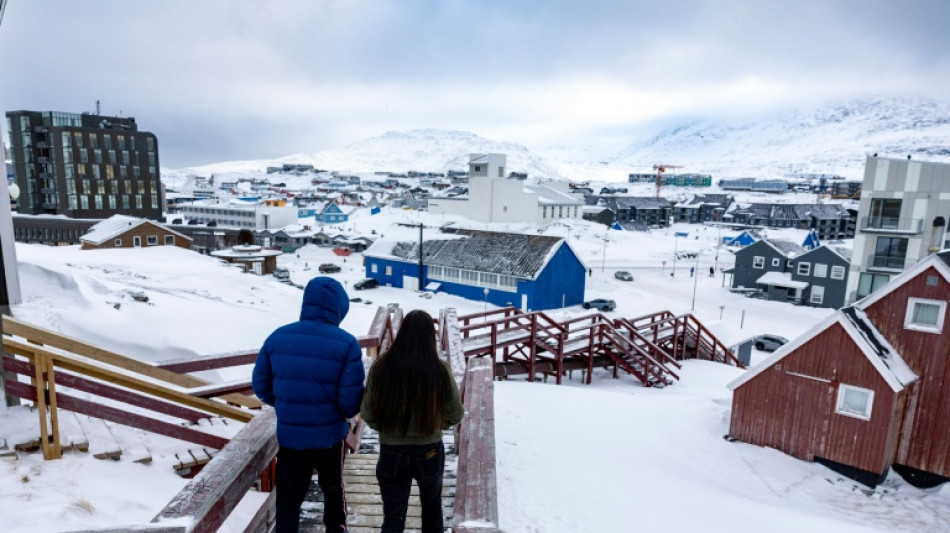
-
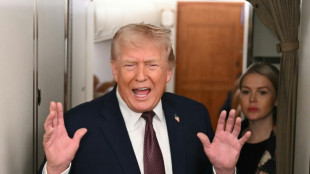 Trump says US will take Greenland 'one way or the other'
Trump says US will take Greenland 'one way or the other'
-
Asian equities, precious metals surge as US Justice Dept targets Fed
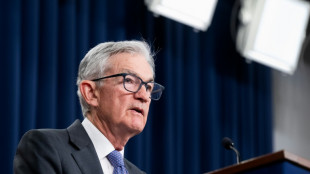
-
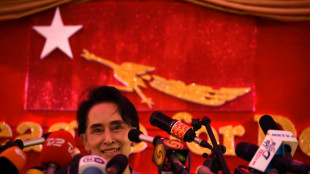 Myanmar pro-military party claims Suu Kyi's seat in junta-run poll
Myanmar pro-military party claims Suu Kyi's seat in junta-run poll
-
Fed chair Powell says targeted by federal probe
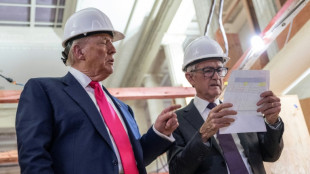
-
 Trailblazing Milos Raonic retires from tennis
Trailblazing Milos Raonic retires from tennis
-
Australia recalls parliament early to pass hate speech, gun laws

-
 'One Battle After Another,' 'Hamnet' triumph at Golden Globes
'One Battle After Another,' 'Hamnet' triumph at Golden Globes
-
Japan aims to dig deep-sea rare earths to reduce China dependence

-
 Top UN court to hear Rohingya genocide case against Myanmar
Top UN court to hear Rohingya genocide case against Myanmar
-
US sends more agents to Minneapolis despite furor over woman's killing

-
 Trump says Iran 'want to negotiate' after reports of hundreds killed in protests
Trump says Iran 'want to negotiate' after reports of hundreds killed in protests
-
Bangladesh's powerful Islamists prepare for elections

-
 NBA-best Thunder beat the Heat as T-Wolves edge Spurs
NBA-best Thunder beat the Heat as T-Wolves edge Spurs
-
Ukraine's Kostyuk defends 'conscious choice' to speak out about war

-
 Trump says working well with Venezuela's new leaders, open to meeting
Trump says working well with Venezuela's new leaders, open to meeting
-
Asian equities edge up, dollar slides as US Fed Reserve subpoenaed

-
 Hong Kong court hears sentencing arguments for Jimmy Lai
Hong Kong court hears sentencing arguments for Jimmy Lai
-
Powell says Federal Reserve subpoenaed by US Justice Department

-
 Chalamet, 'One Battle' among winners at Golden Globes
Chalamet, 'One Battle' among winners at Golden Globes
-
Turning point? Canada's tumultuous relationship with China

-
 Eagles stunned by depleted 49ers, Allen leads Bills fightback
Eagles stunned by depleted 49ers, Allen leads Bills fightback
-
Globes red carpet: chic black, naked dresses and a bit of politics

-
 Maduro's fall raises Venezuelans' hopes for economic bounty
Maduro's fall raises Venezuelans' hopes for economic bounty
-
Golden Globes kick off with 'One Battle' among favorites

-
 Australian Open 'underdog' Medvedev says he will be hard to beat
Australian Open 'underdog' Medvedev says he will be hard to beat
-
In-form Bencic back in top 10 for first time since having baby

-
 Swiatek insists 'everything is fine' after back-to-back defeats
Swiatek insists 'everything is fine' after back-to-back defeats
-
Wildfires spread to 15,000 hectares in Argentine Patagonia

-
 Napoli stay in touch with leaders Inter thanks to talisman McTominay
Napoli stay in touch with leaders Inter thanks to talisman McTominay
-
Meta urges Australia to change teen social media ban

-
 Venezuelans await political prisoners' release after government vow
Venezuelans await political prisoners' release after government vow
-
Lens continue winning streak, Endrick opens Lyon account in French Cup

-
 McTominay double gives Napoli precious point at Serie A leaders Inter
McTominay double gives Napoli precious point at Serie A leaders Inter
-
Trump admin sends more agents to Minneapolis despite furor over woman's killing

-
 Allen magic leads Bills past Jaguars in playoff thriller
Allen magic leads Bills past Jaguars in playoff thriller
-
Barca edge Real Madrid in thrilling Spanish Super Cup final

-
 Malinin spearheads US Olympic figure skating challenge
Malinin spearheads US Olympic figure skating challenge
-
Malinin spearheads US figure Olympic figure skating challenge

-
 Iran rights group warns of 'mass killing', govt calls counter-protests
Iran rights group warns of 'mass killing', govt calls counter-protests
-
'Fragile' Man Utd hit new low with FA Cup exit

-
 Iran rights group warns of 'mass killing' of protesters
Iran rights group warns of 'mass killing' of protesters
-
Demonstrators in London, Paris, Istanbul back Iran protests

-
 Olise sparkles as Bayern fire eight past Wolfsburg
Olise sparkles as Bayern fire eight past Wolfsburg
-
Man Utd knocked out of FA Cup by Brighton, Martinelli hits hat-trick for Arsenal

-
 Troubled Man Utd crash out of FA Cup against Brighton
Troubled Man Utd crash out of FA Cup against Brighton
-
Danish PM says Greenland showdown at 'decisive moment' after new Trump threats

-
 AC Milan snatch late draw at Fiorentina as title rivals Inter face Napoli
AC Milan snatch late draw at Fiorentina as title rivals Inter face Napoli
-
Venezuelans demand political prisoners' release, Maduro 'doing well'

-
 'Avatar: Fire and Ashe' leads in N.America for fourth week
'Avatar: Fire and Ashe' leads in N.America for fourth week
-
Bordeaux-Begles rout Northampton in Champions Cup final rematch


Greenland's mining bonanza still a distant promise
Before it could cast its first gold bar, Amaroq had to build a port and housing, repair a road, and ship over equipment -- a logistical nightmare highlighting the complexities of mining in inhospitable Greenland.
"This is obviously much, much harder than setting up any other business around the world," Eldur Olafsson, the head of the Canadian mining company, told AFP.
Amaroq operates one of only two active mines on the vast Arctic island, a region full of promise for mineral wealth but which has proven difficult to exploit.
From Ukraine, where US President Donald Trump wants to get his hands on natural resources, to the seabeds that numerous companies want to explore, minerals are today at the centre of major geopolitical and industrial ambitions.
Greenland remains almost entirely unexploited, and its minerals are seen as a potential springboard to independence, a goal backed by a majority of the island's 57,000 inhabitants.
Trump's stated ambitions to take over the Danish autonomous territory have only served to boost islanders' support for independence, and the timeframe for full sovereignty has been one of the main topics ahead of Greenland's March 11 legislative elections.
For many Greenlanders -- and probably Trump too -- the wealth generated by the minerals is front of mind.
They would likely generate enough revenue to replace the $565 million Denmark gives Greenland in annual subsidies.
With its underground riches, Greenland "could be a vital player" in the global mining industry, insists Thomas Varming, a geophysicist and consultant at the Geological Survey of Denmark and Greenland (GEUS).
"Many of these deposits that we have are actually crucial for the green transition: minerals that go into batteries -- lithium, graphite -- and also elements that go into super strong magnets that you use in wind turbines or your electric cars or if you want to electrify your trains," he explained.
But in order for those minerals to become a cash cow for Greenland, the price of raw materials has to go up, because right now it's not profitable enough to mine them.
Around 80 percent of Greenland is covered by ice, it has an extreme climate, very little infrastructure, and strict environmental considerations.
All those factors send operating costs soaring, while competitors like mining powerhouse China have few such issues.
- Red lines -
"There have been many mining projects on the table and the short version is: nothing has happened. There has simply not been a business case," said one economist.
Greenland Ruby, which operated a small ruby mine, went bankrupt last year.
"Mineral development is a very slow-moving business. It takes about 16 years to develop into a mine. And in that period of time, you just spend a lot of money. You don't earn a lot of money," stressed Naaja Nathanielsen, Greenland's Minister for Business and Mineral Resources.
"We have a lot of mines in the making, but they are still in this 16-year period," she told AFP in her office in Nuuk, the capital of Greenland.
She said eight companies were due to hold operating licences by the end of the year -- which doesn't necessarily mean there will be that many mines -- and around 80 exploration licences have also been issued.
Greenlandic authorities have drawn several red lines when it comes to mining: no uranium, no oil and gas, and no deep sea mining.
"We are very reliant on our fisheries, and we as a tourist nation try to brand ourselves as a green and pristine place in the world," Nathanielsen said.
"We don't want that image to be tarred by environmental hazards."
For now, the mining industry accounts for just a minute part of Greenland's economy, especially since many of the jobs go to foreigners due to a lack of skilled locals.
Even though the United States and the European Union have both signed memorandums of cooperation with Greenland, a mineral bonanza remains promising but distant, leaving the island without a key pillar needed for its economic independence.
"We are not developing the mineral sector to become independent. We're developing it to get revenue for the Greenlandic society and people, and better welfare. And at some point, we will get to independence as well," Nathanielsen said.
V.Said--SF-PST



